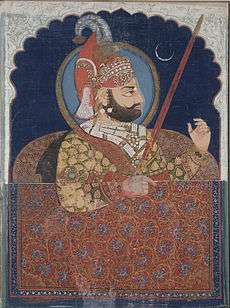Rana (title)

Rana (Sanskrit: राणा) is a historical title of Rajput origin, denoting an absolute monarch.[1] Today, it is used as a hereditary name in South Asia.
Rani is the title for the wife of a rana or a female monarch. It also applies to the wife of a raja. Compound titles include rana sahib, ranaji, rana bahadur, and maharana.
Usage in India and Pakistan

"Rana" was formerly used as a title of martial sovereignty by Rajput kings in India.[2] Today, members of some Rajput clans in Indian subcontinent use it as a hereditary title. In Pakistan—mostly Muslims, but also some Hindus in Sindh (present-day Pakistan)—use it as a hereditary title.[3] Umerkot, a state in Sindh, had a Hindu Rajput ruler who used the title.[4]
In the 16th century, Rana Prasad, the monarch of Umerkot, gave refuge to the Mughal prince Humayun and his wife, Hamida Banu Begum, who had fled from military defeat at the hands of Sher Shah Suri. Their son Akbar was born in the fort of the Rana of Umerkot.[5]
References
- ↑ Seesodia, Jessrajsingh (1915). The Rajputs: A Fighting Race. East and West, ltd. p. 41.
- ↑ Bhattarai, Krishna (2009). Nepal. Infobase Publishing. p. 42. ISBN 9781438105239.
- ↑ "Rajput appeal from Amarkot". The News International, Pakistan. 24 July 2013. Retrieved 10 September 2015.
- ↑ "Rana kin in Pakistan for mourning". The Times of India. Retrieved 10 September 2015.
- ↑ "Umerkot's former Rajput ruler is dead". The Hindu. Retrieved 10 September 2015.